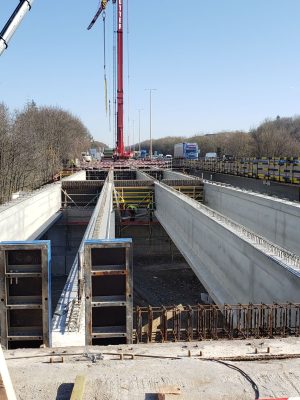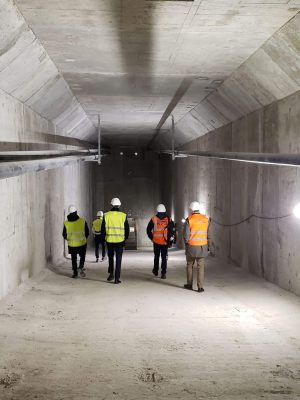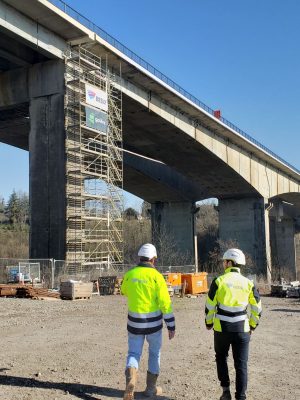Program 2025
4th Edition of Eurobridge – European Conference on Infrastructure Safety
Brussels, April 11, 2025
The fourth edition of Eurobridge, conference dedicated to infrastructure safety in Europe, was held in Brussels on April 11, 2025. The event brought together over 100 participants from the public, private, and academic sectors.
Throughout the day, speakers addressed key topics such as maintenance strategies, carbon footprint reduction, workforce training, and the European Union’s strategic role in infrastructure maintenance.
Opening Session – A Shared Responsibility
The opening session, led by the European Construction Industry Federation (FIEC), the European Union Road Federation (ERF), and the Conference of European Directors of Roads (CEDR), provided an overview of EU policies on infrastructure maintenance. A shared observation emerged: the European Union remains largely absent from this field, considering infrastructure maintenance to be primarily a responsibility of its Member States. These three organizations called on EU institutions to take stronger action and invest more substantially in the sustainable upkeep of infrastructure.
Roundtable 1 – Toward Sustainable Maintenance Strategies
The first roundtable, entitled “Advanced Maintenance Strategies for Long-Term Performance”, highlighted approaches from Italy, Spain, Romania, Belgium, and France. Divided into two parts, the session first presented national-level strategies, followed by practical solutions such as modular bridges, digital bridge management systems, and asset stabilization approaches. These exchanges underscored both the variety of challenges faced across Europe and the potential for innovative, transferrable practices.
Roundtable 2 – The Critical Issue of Training
The second roundtable, “Training for Infrastructure Maintenance”, focused on growing labor market pressures: shortages of qualified workers, skill mismatches, and the need for upskilling. Participants unanimously emphasized the urgent need to incorporate maintenance into the curricula of training centers, schools, and educational institutions. It was reiterated that the future of the sector will increasingly revolve around maintenance and rehabilitation, rather than the construction of new infrastructure.
Roundtable 3 – Reducing the Carbon Footprint Through Sustainable Maintenance
The final roundtable, “Reducing the Carbon Footprint Through Sustainable Infrastructure Maintenance”, showcased several innovative tools:
- Belgium introduced its CO₂ performance scale, a selection criterion now integrated into public procurement processes.
- France, through the National Federation of Public Works, presented SEVE-TP, an eco-comparison tool that assesses the environmental impact of a project throughout its lifecycle.
- A Spanish contractor also shared the measures implemented within their company to reduce its overall carbon footprint.
The conference concluded with a noteworthy presentation by an American expert, who provided insights into U.S. infrastructure maintenance models, offering a valuable transatlantic perspective on shared challenges and potential solutions.
You can download the program for information (on the right).
Next Edition: April 10, 2026 – Brussels
Join us once again for an edition rich in dialogue, innovation, and European partnerships focused on infrastructure safety and sustainability.
Registrations (closed)
Please fill out the form below with all the necessary information. We will verify if we can welcome you to our conference and send you a confirmation email with registration form to complete.
Past Editions
2024 edition
The 3rd edition of EUROBRIDGE, conference on bridge safety in Europe, was held in Brussels on 5 April 2024 and gathered 100 participants.
The invited speakers and experts discussed maintenance models, as well as carbon impact of failed maintenance and the training of skilled technicians and engineers to provide effective support.
Germany notably presented its model to modernise bridges and its carbon pricing proposition in the procurement process. While Italy shared concrete examples of remarkable rehabilitation of structures.
Bridges are essential for our road and rail networks and are fundamental for the social and economic development of our societies. However, most of them need increasingly extensive rehabilitation work. This represents a huge potential for construction companies, all over Europe.
2023 edition
The 2nd edition of EUROBRIDGE conference took place on April 14th, 2023.
The conference was focused on bridge maintenance and safety in Europe and aimed to put forward issues around engineering work maintenance in the respect of environment, with an eye on the decrease of carbon footprint, as well as the training of new professionals in the sector. With keynote speeches by Christian Tridon (FIEC), Philip Crampton (FIEC Past-President), MEP Dominique Riquet (member of the EP Transport Committee), from Germany, Italy, etc. the event was organised in 3 Roundtables: inspection and management, the environmental impacts of bridges and new professions for bridge management.
Bridges are essential elements of communication routes, whether road or rail. It is essential to keep them in good working state. The maintenance of a bridge always starts with the perfect knowledge of its condition. The diagnosis allows to establish the corrective measures. The conference presented a selection of original examples implemented in some European countries.
Site visits
To alert on the necessity of maintaining our infrastructure state, EUROBRIDGE is organizing every year, in the margins of the conference, site visits. EUROBRIDGE invites political figures of the region, administrations, entrepreneurs, engineers etc. to participate in those visits, and realize the impact these communication infrastructure have on the economic and social surroundings.
Huccorgne Viaduct, Belgium, 2023
The first site visit took place in Belgium, in March 2023, to discover the rehabilitation works on the Huccorgne Viadduc, conducted by Besix and Galere. The bridge was built in 1969-1970, and it encounters a daily traffic of 60 000 vehicules. The bridge suffered from its usage, from adverse weather conditions, from a lack of maintenance etc. Most bridges in Belgium are 40 years old and plus. Maintaining those allows to extend their service life and reduce the carbon impact of their structures.
Theodor Heuss Bridge, Germany, 2024
In 2024, EUROBRIDGE organized a site visit in Germany, to the Theodor Heuss Bridge, pre-stressed concrete beam road bridge built in 1969, in Essen. This bridge carries the A44 motorway across the river Ruhr and an adjoining railway line. In 2017, Autobahn studied the bridge’s conditions and revealed it needed urgent care (they grated it 2.5 – in a grading system assessing durability, safety, traffic, and where 1 is the best and 4 the lowest). The contractor Eurovia has been appointed to carry out the 4.6 million EUR project. Thanks to the rehabilitation works, Autobahn hopes to extend its life until 2037, “deferring an estimated cost of at least €30-40 million (US$32.2-$43 million) for its wholesale demolition and replacement” (cf. A critical moment for Germany’s bridges – Construction Briefing).
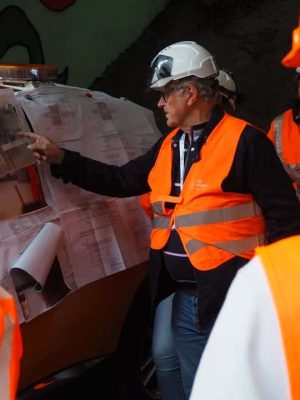
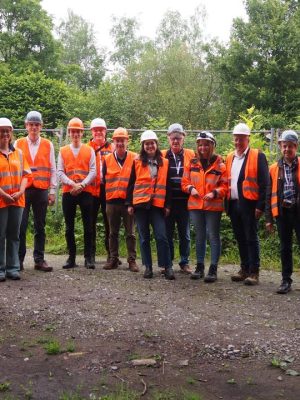
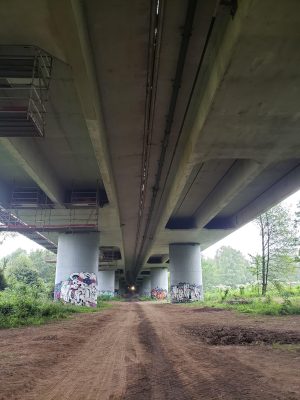
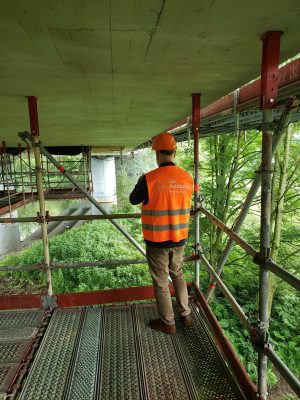
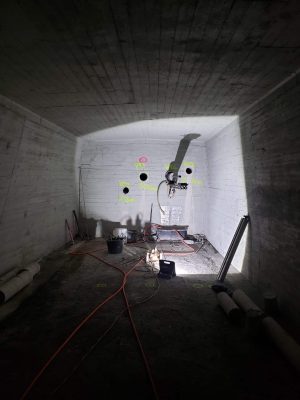
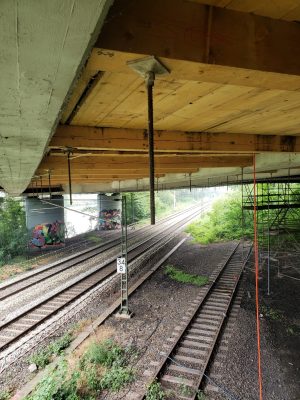
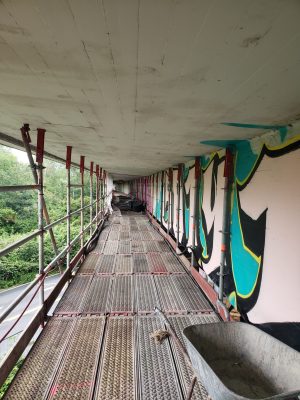
Let's get down to business!
Wondering ipsum dolor sit amet? We consectetur adipiscing ipsum nulla glavrida elit tempor incididunt ut labore.

